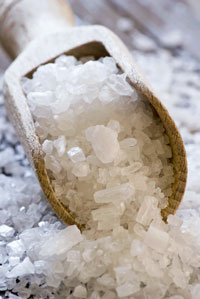Contributed by Angie Larson, Clive, IA
Warm-up Question
What is your favorite use for salt?
asSALTed
 The Salt Institute has discovered that there are more than 14,000 uses for salt, or to use the scientific name, sodium chloride. Salt gets a bad reputation these days from being overused. It’s been in the news lately because of being reduced in school lunches. While too much salt is certainly bad for you; it is essential for our survival. Our bodies do not naturally make sodium chloride so we need to consume it in order to make blood, sweat, digestive juices, and tears.
The Salt Institute has discovered that there are more than 14,000 uses for salt, or to use the scientific name, sodium chloride. Salt gets a bad reputation these days from being overused. It’s been in the news lately because of being reduced in school lunches. While too much salt is certainly bad for you; it is essential for our survival. Our bodies do not naturally make sodium chloride so we need to consume it in order to make blood, sweat, digestive juices, and tears.
Salt also has historical significance. Salt was used as one of the earliest forms of money and trade; at one time the value of an ounce of salt was an ounce of gold. Roman soldiers were partly paid in salt. It has been used as a preservative to help food stay good for longer. Salt has been used as a flavoring agent. Have you ever put a tablespoon of salt in a glass of chocolate milk? It helps change the flavor of the veggie’s you might not want to eat or makes your popcorn delicious.
Salt can be used as a cleaner. You can use salt to clean your bathroom or polish tarnished brass or copper. Salt has healing properties. You can use it as a mouthwash to clear up canker sores or as an antiseptic. Salt keeps us safe. Salt is spread on icy roads and highways to keep our feet and cars from slipping. It is used to soften our water, removing chemicals that we don’t want in our water. Salt can also put out grease fires, drive away ants, kill poison ivy, and deodorize your shoes. The Bible mentions salt a number of times, but what exactly does that mean? It has so many different uses.
Discussion Questions
- What was a new use of salt that you didn’t previously know?
- If you were one of the italicized uses for salt, what would you be?
- How has your perception of salt changed after looking into it more deeply?
Scripture Texts (NRSV) for Sunday, September 30, 2012 (Eighteenth Sunday after Pentecost)
(Text links are to Oremus Bible Browser. Oremus Bible Browser is not affiliated with or supported by the Evangelical Lutheran Church in America. You can find the calendar of readings for Year C at Lectionary Readings.)
For lectionary humor and insight, check the weekly comic Agnus Day.
Gospel Reflection
What is it about salt? Though salt is timeless and used in the Bible, like water and wine, it is not commonly used in our worship services. Jesus calls us salt. In the text for today, John warns Jesus that someone outside their small band of disciples is casting out demons in Jesus’ name. John is concerned that there are people who are against the work which Jesus and the disciples are doing. That is a valid worry; some were against Jesus. However, Jesus offers up a positive judgment, “if they are not against us, then they are for us.”
Jesus then tells the disciples to look at temptations to sin. He says it is better to remove the part of you that is sinful then to let the whole be spoiled. Salt, as we looked at before, can be used as a preserving agent in meats to keep them fresh for long periods of time. If the salt ceases to do its job the whole slab of meat may spoil. It is better to remove the poorly salted portion which has gone bad than to lose the whole piece.
Jesus says, “Have salt in yourself”. What does this mean? Salt has many uses. Can we be a preserver of others or of ourselves by standing firm in the gospel? Maybe we are called to cleanse ourselves from that which we know draws us to sin? Perhaps we can be flavor, being creative, adding interest and depth to the world. Maybe we are healers; reminding others of what Jesus has done for them. Maybe we keep people and ourselves safe, by recognizing what is not good with the world, working to avoid it in ourselves, and fixing it if we can. Jesus says, “Salt is good… and to have salt in yourself.”
Discussion Questions
- When Jesus says to “have salt in yourself” what property of salt do you think that applies to?
- Having read the Scripture text, what do you think was the disciples’ original reaction?
- How can you serve as ‘salt’ to another person?
- In what ways do you need to preserve yourself?
Activity Suggestions
- Play with some salt. Get a couple of different kinds, sea salt, table salt, rock salt. Have students create art using the salt, paper, and glue.
- Eat some salt. Offer some salty snacks such as pretzels, chips, or even pancakes.
- Experiment with some salt. Get an old fashioned ice cream maker and have the students make ice cream throughout the class. Watch how the salt, combined with the ice, makes the cream freeze.
- Spread the salt. Give your students a little bag of salt with a reminder to ‘Have Salt in themselves and be at peace with one another. Mark 9:50”
Closing Prayer
Dear Lord Jesus, Thank you for blessing us with this time together. We are salt and salt is good. Help us to see your activity in our lives and in the lives of those around us. Help us to see our many uses and the variety of ways we can be of service to you and to others. Please use us Lord for your kingdom. Amen.


 A recent national poll found that Americans are largely angry at their government and disappointed by the lack of ideas from both political parties.
A recent national poll found that Americans are largely angry at their government and disappointed by the lack of ideas from both political parties. Jesus took it even further than that though. He suggests that just because someone isn’t ‘one of us’ doesn’t mean we should reject that person’s actions or intentions. If they are showing unselfish compassion and concern for others, give thanks and don’t shrug them off. If they are trying to help or care for us, then accept it and give thanks. Encourage them; don’t reject them. It is possible for others to do God’s work even though they are not members of our denomination or official members of our congregation.
Jesus took it even further than that though. He suggests that just because someone isn’t ‘one of us’ doesn’t mean we should reject that person’s actions or intentions. If they are showing unselfish compassion and concern for others, give thanks and don’t shrug them off. If they are trying to help or care for us, then accept it and give thanks. Encourage them; don’t reject them. It is possible for others to do God’s work even though they are not members of our denomination or official members of our congregation.